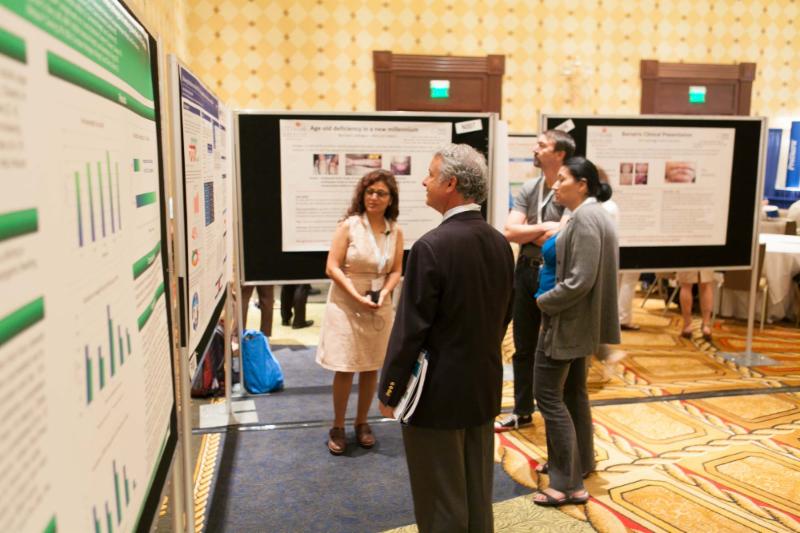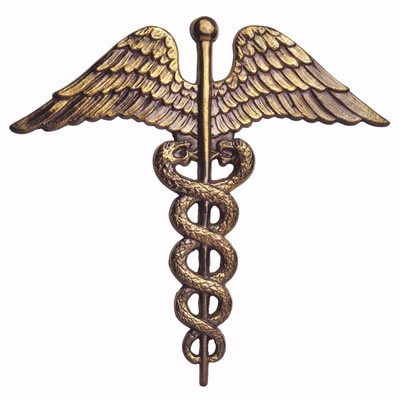|
Contact Us
| |
Bariatric Physicians
2821 S. Parker Road
Ste. 625
Aurora, CO 80014
303.770.2526 | asbp.org
Staff
Laurie Traetow, CAE, CPA
Executive Director
laurie@asbp.org
Beth Amelon
Sponsorships & Exhibits Coordinator
beth@asbp.org
Carly Crosby
Meeting Planner & Executive Coordinator
carly@asbp.org
Marcie Gonzales
Receptionist
marcie@asbp.org
|
|
|
|
Obesity Medicine e-Weekly
|
President's Update
|
| |
ASBP in the exhibit hall at the Canadian Obesity Summit
|
ASBP represented at Canadian Obesity Summit
By Dr. Eric C. Westman, ASBP President
The Fourth Canadian Obesity Summit took place in Toronto from April 28 to May 2, and ASBP was represented. This is the every-other-year national meeting put on by the Canadian Obesity Network, led by Dr. Arya Sharma. Dr. Sharma has taught at ASBP for many years and is one of the principal researchers behind the Edmonton Obesity Staging System (EOSS). The EOSS is included in the Obesity Algorithm® as a useful alternative to the "BMI-centric approach" to obesity assessment.
It seemed to me that the Summit was a hybrid between the ASBP, ASMBS, and TOS meetings. The health system in Canada is very different than in the U.S., making the content of the meeting also very different than the obesity meetings in the states. Because the use of medication and bariatric surgery is severely limited, most of the meeting content was focused on weight bias, behavioral and lifestyle treatments, and research related to causation and treatment that wasn't quite "ready for prime-time." Until March of this year, there was only one medication approved for the treatment of obesity: orlistat. Hopefully the approval of Saxenda (liraglutide, Novo Nordisk, Inc.) will portend for more medication availability for Canadian physicians to use to treat obesity.
I think it is essential for ASBP to be at the forefront at these international meetings. Our knowledge about the effective use of behavioral, lifestyle, and medication treatment in a clinical setting goes far beyond what is commonly known elsewhere. This exposure will no doubt lead to greater interest and growth for ASBP.
|
News
 Apply to join the ASBP Board of Trustees
ASBP is now accepting applications for the 2015-2016 Board of Trustees. Interested candidates must complete an application and submit it to ASBP (email, fax, or mail) by June 5. Available positions include:
- President-elect (two-year term)
- Vice president (one-year term)
- Secretary/treasurer (one-year term)
- Trustee (four positions available, each a two-year term)
 Obesity Algorithm featured in Medscape slideshow The Obesity Algorithm is one of many references quoted in a recently released Medscape slideshow, written by ASBP member and algorithm co-author, Dr. Harold Bays. The slideshow, titled "Obesity: How to Diagnose and Treat an Epidemic," explains the different approaches to clinical obesity treatment found in the Obesity Algorithm. The slideshow is available for free online viewing (a free Medscape login is required), and the Obesity Algorithm is available for free online download at www.ObesityAlgorithm.org.  Get fit, don't sit National "Get Fit, Don't Sit" Day is Wednesday, May 6. On this day, the American Diabetes Association aims to increase awareness about the health problems associated with sitting all day. Participate in Get Fit, Don't Sit Day tomorrow by standing up, moving, and encouraging others to do so as well. You may also download a free e-toolkit with ideas for making your Get Fit, Don't Sit Day a success.
|
Foundation
 Abstract submission opens Friday, May 8
Oral abstract and poster presentations will take place at Overcoming Obesity 2015 in Washington, D.C. The abstract submission portal will open May 8, and submissions will be accepted until June 22. Read more about abstract submission, and plan to submit your abstract before June 22.
Shop on AmazonSmile for Mother's Day
Looking for a last-minute gift for mom this Mother's Day? Order something for her online from AmazonSmile! AmazonSmile is a charitable initiative started by Amazon.com. Once you select the Obesity Treatment Foundation (OTF) as your charity, Amazon will donate a portion of your purchase to OTF every time you shop! Mother's Day is May 10, so shop online for a Mother's Day gift before it's too late!
|
Resources
 The Obesity Treatment Foundation (OTF) helps keep you up to date on current obesity research! Each week, OTF publishes a brief overview of three recent studies so you can be in the know, even during your busiest days. Click the titles below to view the full articles, and please consider supporting OTF so we can continue to provide you with updates on the latest research. The Obesity Treatment Foundation (OTF) helps keep you up to date on current obesity research! Each week, OTF publishes a brief overview of three recent studies so you can be in the know, even during your busiest days. Click the titles below to view the full articles, and please consider supporting OTF so we can continue to provide you with updates on the latest research.
Snijders, T., et al. Journal of Nutrition, 2015.
Consuming protein immediately before sleep may be an effective time to increase muscle protein synthesis given that there are few other metabolic disruptions during this time. Researchers examined the effect of dietary protein supplementation before sleep on muscle mass and strength gains during resistance-type exercise training. The group that took a protein supplement containing 27.5 grams (g) of protein, 15 g of carbohydrate, and 0.1 g of fat every night before sleep had increased muscle mass and strength gains compared to the placebo group. Protein ingestion, particularly before sleep, may be an effective strategy to increase muscle mass.
Lusi, E. A., et al. PLoS One, 2015.
The prevalence of nickel allergy in the general population is 8-15 percent for females and 1-3 percent for males. However, an allergy unit in Ireland incidentally noticed an unusually high prevalence of nickel allergy among women who were overweight, and specifically among those who had metabolic syndrome and were around peri-menopausal age. The researchers put these individuals on a low-nickel diet for six months, which led to a significant decrease in body mass index (BMI) and waist circumference. There was no control group in this study, so it cannot be determined if any type of diet would lead to this beneficial response. More studies are needed to determine if treatment of nickel allergy specifically has beneficial effects on obesity.
Teaching our children when to eat: How parental feeding practices inform the development of emotional eating: A longitudinal experimental design
Farrow, C. V., et al. AJCN, 2015.
Emotional eating can lead to weight gain, and this feeding behavior is likely learned at a young age. Researchers tested how 5- to 7-year-old children were impacted by parents who used overly controlling feeding practices at ages 3 to 5. The study found that parents who used food as reward and restricted food for health reasons were more likely to have children who eat more when feeling negative emotions. These findings suggest that parents may unintentionally cause negative eating habits in their children when attempting to overly control their child's food intake at a young age.
|
Advocacy
 Update on April 27 Advocacy Day
On April 27, leaders from the Obesity Care Continuum (OCC), including ASBP Advocacy Committee member Dr. Spencer Berry (pictured), descended on Capitol Hill as part of the OCC's monthly advocacy day program. The goal of this program is to educate legislators and their staff about the OCC's advocacy priorities at both the federal and state levels. Issues that were discussed included the obesity community's support for the Treat and Reduce Obesity Act (TROA) and implementation of the Affordable Care Act's essential health benefit (EHB) provisions at the state level.
Dr. Berry visited seven offices in the North Dakota, South Dakota, and Montana congressional delegation. Issue number one for the these visits was securing support for the Treat and Reduce Obesity Act - legislation that will expand obesity drug coverage and intensive behavioral counseling treatment options under the Medicare program. In addition, Dr. Berry discussed the continuing concerns that the obesity community is having with state health exchange plans that are predominantly excluding coverage for evidence-based obesity treatment services. For example, OCC highlighted how 28 state exchange plans currently exclude coverage for bariatric surgery and nearly all fail to cover weight-loss programs or FDA-approved obesity drugs.
When asked what Congress could do to address the issues with state health exchange coverage, OCC leaders urged congressional offices to continue to press Health and Human Services Secretary Sylvia Burwell to issue guidance to state exchanges that would mirror the coverage policy recently adopted by the Office of Personnel Management for the Federal Employees Health Benefits (FEHB) Program. This policy precludes FEHB carriers from excluding coverage for obesity treatment services based on the health plan's perception that obesity is a lifestyle condition or that treatment is cosmetic in nature. Numerous Senate offices were intrigued by this idea.
|
Education
-
Full Conference
30 CME | Sept. 30-Oct. 4 | RegisterIncludes the Obesity Medicine Certification Review Course and the Fall Obesity Summit.
-
Obesity Medicine Certification Review Course12.5 CME | Sept. 30-Oct. 1 | RegisterProvides preparation to those planning to take the American Board of Obesity Medicine certification exam.
-
Fall Obesity Summit17.5 CME | Oct. 2-4 | RegisterEnhance your knowledge about the latest research and trends in the field of obesity medicine at this summit, with all-new content for the fall.

More Obesity Basic Medical Treatment courses scheduled this summer
Our winter season of Obesity Basic Medical Treatment courses is finished, but we're offering another series of courses this summer! Do you know anyone who wants to learn the basics of medical obesity treatment but doesn't know where to start? The Obesity Basic Medical Treatment (OBMT) course teaches physicians and health care providers who are brand new to the field of obesity medicine about the basic approaches to obesity treatment. Attendees can then decide whether or not to pursue further obesity medicine education or understand when to refer a patient to an obesity medicine clinician. Learn more about this course, or register online for one of the following dates and cities.
|
|
|
|
|